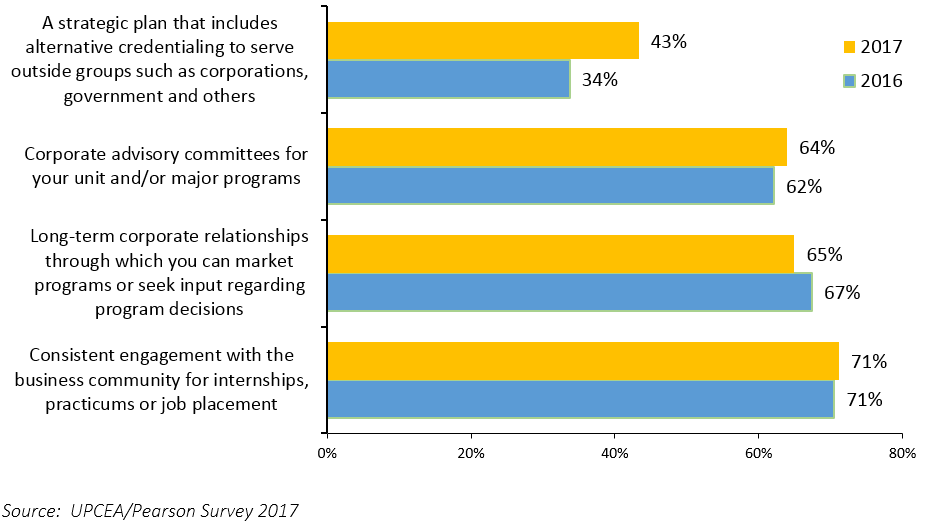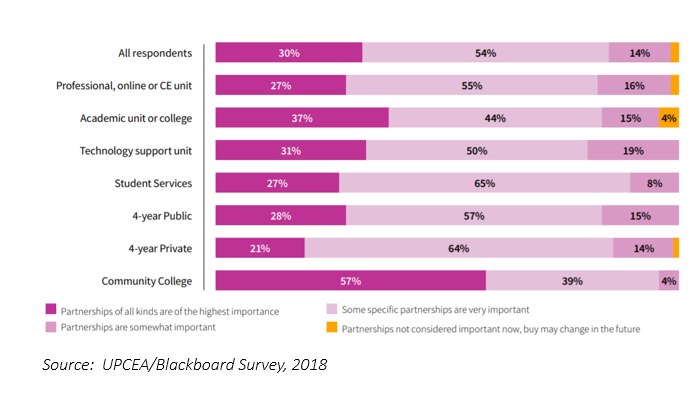Addressing Declining Enrollments Through Partnerships
According to data from the National Student Clearinghouse, colleges and universities have seen more than six years (or twelve periods) of enrollment decline nationally. Further confirming this are findings from the WCET/Babson study that shows that traditional classroom enrollments have been in decline, to the extent of a decline of over a million enrollments between 2012 and 2016. With enrollments shifting toward online degrees, massive open online courses (MOOCs) and alternative credentials, colleges and universities need to improve their enrollment streams and student supply chains. With impending competition likely to increase in the near future, close partnerships between colleges and universities with outside providers may prove to be critical, especially in the advancement of alternative credentials and MOOC development. However, higher education’s views or strategies toward the nurturing of partnerships may be inconsistent, one-sided, tactical or highly-political. While the figure below shows a relatively high percentage of institutions in communication with outside stakeholders, the quality or depth of the relationship is of question.

The most effective partnerships create mutually beneficial outcomes. Recent partnerships between Georgia Tech and AT&T in the development of a massive open online course (MOOC) master’s degree in computer science, Trilogy Education and Rutgers University partnering on coding bootcamps and Arizona State University with Starbucks allow for a shorter development time, creating more customized education, addressing employment shortages or using education to retain and grow employees.
A recent joint study by UPCEA and Blackboard shows that not all professional, continuing or online education units or types of institutions place equal importance on partnerships or show the same urgency. Community colleges have suffered over the past decade with maintaining consistent enrollments. Most likely, as a result, they see partnerships as critical to their survival.

Creating non-degree programs with the highest reward while minimizing risk is highly dependent on being close to the decision-maker or end-user/student. Mass marketing or targeted digital marketing could be a method to reach them and promote programs and market research as a tool to understand programmatic and delivery preferences. However, strong partnership efforts, such as highly representative advisory boards and focused communications, can accelerate program development, as well as provide a more direct path to enrollments and revenue. Further complicating relationship and partner development is the persona or demographic of the decision-maker. UPCEA recently surveyed over a thousand Boomer, Generation X and Millennial managers. The research suggests different values and perceptions toward college and universities in providing alternative credentialing. The research also showed that Millennial managers seek many information channels in assessing training and education needs for their companies, which implies generational differences in partnership development and assessment.
Learn more about UPCEA's expert consultants.
Do you need help with your PCO unit or campus? We can help. Contact UPCEA Research and Consulting for a brief consult. Email [email protected] or call us at 202-659-3130.
Trusted by the nation's top colleges and universities, UPCEA Research and Consulting provides the best value in the industry today. UPCEA's industry experts have years of experience in Online and Professional Continuing education - put them to work for you!
UPCEA Research and Consulting offers a variety of custom research and consulting options through an outcomes-focused pricing model. Find the option(s) that best suit your institution.
Learn more about UPCEA Research & Consulting
The UPCEA Difference
Unmatched Experience: For more than 100 years, UPCEA consultants have exclusively served the needs of online and professional continuing education programs. UPCEA consultants leverage their extensive industry expertise to expedite solutions, anticipate upcoming shifts, and offer distinct best practices, effectively aiding clients in achieving their goals.
Cost Effectiveness: As a nonprofit, member-serving organization, we provide unmatched value, allowing you to maximize limited research and consulting budgets.
Action in Motion: Our cadre of experienced, skilled authorities and expert practitioners propels you forward, translating research and consulting into impactful implementation, a distinctive hallmark of UPCEA. Our team of current and former institutional leaders will support you, turning research and consulting into action.
Mission Alignment: Like you, our mission is to enhance and expand educational opportunities and outcomes for adult and other non-traditional learners. We share your values and work in partnership with you to advance access and excellence in education.
